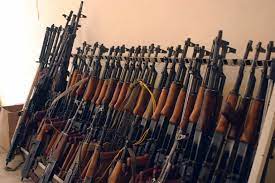APA-Accra (Ghana) – In Ghana, less than six thousand CFA francs is enough to manufacture an artisanal firearm.
In West Africa, the trade in craft weapons is a threat to the lives of the population. According to a study published Monday, November 6, by the Institute for Security Studies (ISS), these weapons, manufactured in Ghana at a derisory cost, can be found in a number of countries in West Africa, particularly in the Sahel nations plagued by jihadist violence.
“While illicit manufacture is a major concern for Ghana’s internal security, the threat extends beyond its borders. Ghanaian homemade weapons often fuel conflicts in neighbouring states. Explosive devices found in Mali and Guinea, among other countries, have been traced back to Ghana. Similarly, growing instability in neighbouring Burkina Faso has led to a flourishing illicit trade in small arms,” said Abdelkader Abderrahmane and Solomon Okai, authors of the study.
It is the first to be published by ENACT, a project funded by the European Union (EU) and implemented by ISS in partnership with Interpol and the Global Initiative Against Transnational Organized Crime.
In Ghana in particular, they estimate that nine US dollars, or about 5,500 CFA francs, is enough to make a homemade firearm.
“Gunsmiths produce about 200,000 illegal guns a year and sell them for between $90 and $150. These weapons are widely used by criminals in domestic burglaries, banditry, trafficking and reprisal operations,” Abderrahmane and Okai stressed, adding that “the makers of illegal weapons are generally blacksmiths,” whose know-how is passed down from one generation to the next, or sometimes to apprentices.
“Blacksmiths supply home-made weapons to middlemen who then sell them to traffickers. The latter then smuggle them across the border, supplying well-established distribution networks. At the local level, the weapons are supplied to criminals in regions close to where they were made and to traffickers in Nigeria and Sierra Leone who have no fear of prosecution,” they described, showing that “despite the ban on arms production,” Ghana has one of the most sophisticated production and trafficking networks in the region.
President Nana Akuffo-Addo’s country has a “coding system” to clearly distinguish between weapons used by security services and those used by civilians, an effort in line with the Economic Community of West African States (ECOWAS) Convention on Small Arms and Light Weapons, which requires member countries to mark firearms to facilitate identification and traceability. However, Abdelkader Abderrahmane and Solomon Okai point to other measures that could “put a stop to this illicit economy” that threatens the security of thousands of Africans.
These include creating a “database of all blacksmiths in Ghana” to identify those involved in the artisanal production of firearms, “ensuring the conformity of the production of legal products, such as agricultural tools,” and “recognising the likely involvement of public officials in facilitating illegal trade, particularly at borders.”
However, “a more interesting approach would be to regulate the artisanal arms industry so that blacksmiths operate legally and the state can easily control the trade,” the authors said as they remain convinced that such “measures will contribute significantly to the African Union’s ambitious but crucial goal of silencing the guns in Africa by 2030.”
ODL/ac/lb/as/APA


